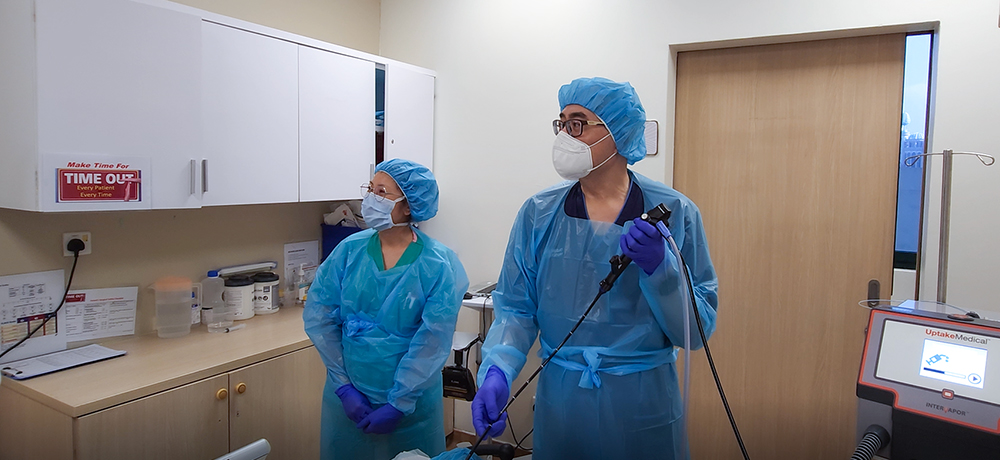COPD Explained: What Our Lung Specialist Wants You to Know
23 April 2025

Most people know about asthma. But many have not heard of Chronic Obstructive Pulmonary Disease (COPD), a common and serious lung disease.
Early symptoms of COPD can seem like normal signs of getting older. Many people do not seek help until the disease has gotten worse.
Dr Megat Razeem, our Consultant Respiratory Physician, Interventional Pulmonologist & Sleep Medicine Specialist, explains more about COPD and what you need to know.
What Is COPD?
COPD happens when the airways become blocked, making it hard for air to move in and out of the lungs. This is usually caused by long-term exposure to harmful substances, which leads to damage that causes swelling and irritation in the lungs.
Some of the most common causes of COPD include cigarette smoking and exposure to biomass fuel smoke (e.g., charcoal burning used for cooking).
COPD usually develops later in life, often when a person is in their 60s or 70s. While there is no cure, treatment can help manage symptoms and slow the disease's progression.
There are two main types of COPD:
- Chronic bronchitis: This type mainly affects the airways. It causes constant swelling in the airways and too much mucus production, which makes it hard to breathe.
- Emphysema: With this, the tiny air sacs in the lungs, called alveoli, are damaged. They become enlarged, making it harder for the body to take in oxygen and remove carbon dioxide. When carbon dioxide levels build up, it can cause drowsiness and wheezing.
What Are Common Symptoms of COPD?
The main symptoms of this lung disease can be easy to miss. However, left untreated, COPD will get progressively worse. The main symptoms of COPD may include:
- Shortness of breath
Patients might notice they get out of breath more easily. For example, if the individual could walk 300 meters before, now they may only manage 100 meters before needing to rest. - Chronic cough and wheezing
If a cough lasts more than eight weeks, it could be a sign of chronic bronchitis. The body makes extra mucus, which clogs the airways. This leads to coughing as the body tries to clear it.
When COPD Symptoms Suddenly Get Worse
Sometimes, COPD symptoms can suddenly get severe. These are called flare-ups, and it is important to get medical help right away. They are often caused by a simple viral infection, like the common cold. When this happens, the airways become inflamed and filled with mucus, causing severe symptoms because of their already weakened lungs.
With each flare up, shares Dr Megat, your lung function will decline further.
“Flare-ups are associated with an increased risk of mortality. If you have two or more flare-ups a year, your risk of dying is actually very high,” explains Dr Megat.
Smoking and COPD
Think quitting smoking will not help if you already have COPD?
Think again. According to Dr Megat, continuing to smoke will speed up the decline in lung function and increase the chances of flare-ups.
The good news? By quitting smoking, one’s lung function can gradually improve. After about 10 years, it may become similar to that of non-smokers of the same age.
Does Vaping Increase the Risk of COPD?
While the link between cigarette smoking and COPD is well established, thanks to decades of research, the same cannot yet be said for vaping.
Vape products have only been around for 10 to 15 years, and most users are younger, so we do not yet know the long-term effects. This is important because COPD typically only develops later in life.
Still, Dr Megat believes the risks could be similar, alluding to serious cases of vaping-related lung injury (EVALI) that caused deaths among young people here in Malaysia.
Advice for Those with COPD
Besides quitting smoking, Dr Megat encourages people with COPD to stay up to date with their vaccinations. This is important because viral infections are a common trigger for flare-ups. Recommended vaccines include the pneumococcal, influenza, and RSV vaccines.
He also stresses the importance of attending regular follow-up appointments. COPD treatment is not the same for everyone; what works for one person may not work for another. It often takes some trial and error to find the right combination of treatments to manage symptoms and reduce flare-ups.
“If patients find their medication hard to use or don’t feel it’s helping, we can adjust it to suit them better,” says Dr Megat.
If you experience COPD symptoms or believe your loved one may be, do not wait. A check up with a Respiratory Medicine Specialist is crucial to help you manage symptoms and prevent the lung disease from worsening further. Make an appointment here.
Back





